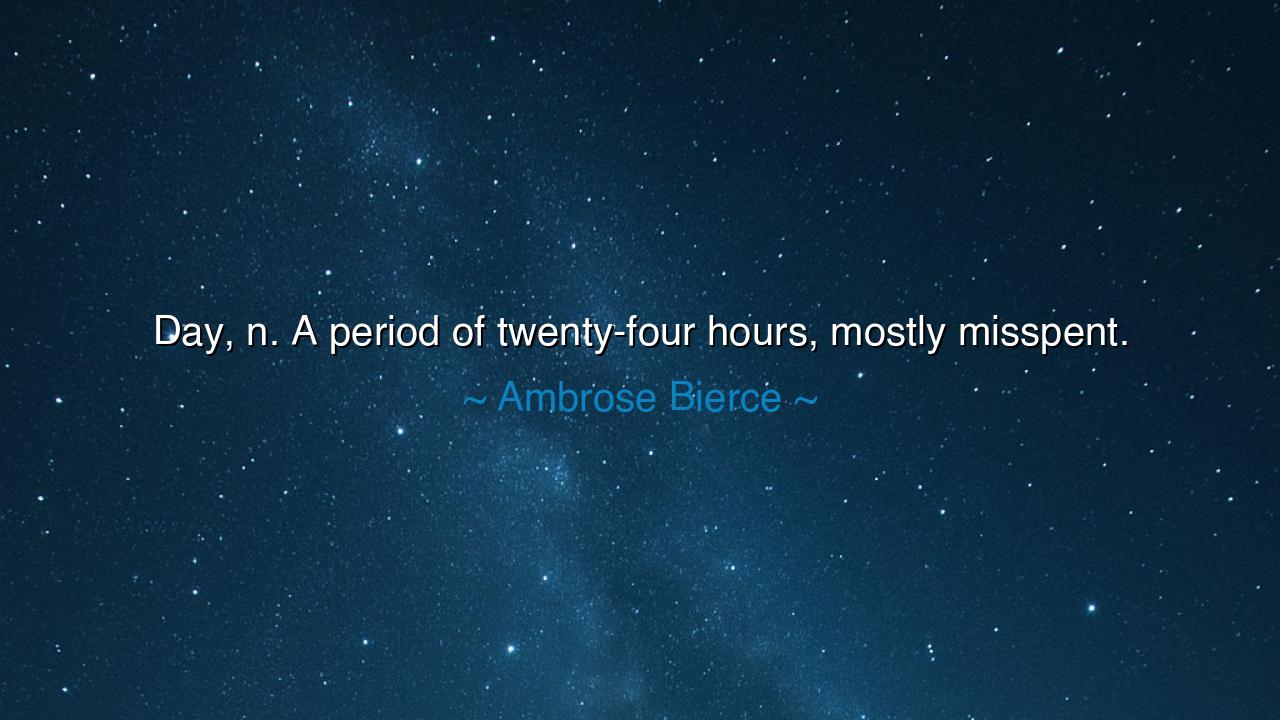
Day, n. A period of twenty-four hours, mostly misspent.






Ambrose Bierce, the sharp-tongued satirist and author of The Devil’s Dictionary, once defined the word day in his own darkly humorous way: “Day, n. A period of twenty-four hours, mostly misspent.” With this witty stroke, Bierce pierced the heart of human folly. He suggests that while the day is a sacred gift of time, filled with boundless potential, most men and women squander it in idleness, distraction, or trivial pursuits. His words sting, for they awaken us to the uncomfortable truth: our lives are not wasted all at once, but one day at a time, in the careless spending of hours.
The origin of this quote lies in Bierce’s The Devil’s Dictionary, a work where he mocked human weaknesses by redefining ordinary words with biting irony. It was his way of stripping away illusions, forcing readers to laugh even as they squirmed in recognition. Here, his definition of day is not mere cynicism, but a mirror held up to society, reminding us that the greatest wealth—time—is too often treated as worthless. He speaks as one who understood both the brevity of life and the tendency of mankind to drift through it half-asleep.
History provides vivid examples of this truth. Consider the young Emperor Nero, who squandered his days in vanity, indulgence, and cruelty. Rome burned while he played his lyre, blind to the passing of time and the urgency of his duty. His reign, though marked with opportunities to shape greatness, became a symbol of waste. The empire endured, but his name became a curse, remembered not for creation but for misspent days. Here we see Bierce’s wisdom made flesh: a single day wasted may seem harmless, but many such days can destroy both man and nation.
Yet, in contrast, there are those who redeem each day as if it were a jewel. Think of Florence Nightingale, who during the Crimean War used the same twenty-four hours others squandered on despair and complaint to bring light, order, and healing to wounded soldiers. Her nights were spent by lamplight, tending the dying; her days were filled with discipline and resolve. To her, no day was misspent, for each was poured into service. Her life teaches us that the measure of a day is not in its length, but in what we dare to do with it.
The deeper meaning of Bierce’s biting remark is not to condemn mankind alone, but to awaken it. If most days are misspent, then let us ask: what is it to spend them well? It is not merely to toil endlessly, nor to chase wealth or pleasure, but to fill the hours with purpose—whether in work that builds, love that heals, or wisdom that grows. Bierce’s cynicism becomes, in the hands of the wise, a challenge: do not prove him right with your own life.
The lesson is clear: the day is both fleeting and eternal. Fleeting, because once lost, it cannot be reclaimed. Eternal, because what we do within it may echo far beyond its twenty-four hours. To waste a day is to lose a treasure beyond price; to use it well is to carve eternity into the passing of time. Therefore, rise each morning as though standing before the gates of destiny, and ask: how will I shape this day, so it is not misspent?
Practically, this means living with intention. Guard your mornings as sacred, for they set the tone of the hours. Choose one act each day that builds your character, one act that strengthens your body, one act that nourishes your spirit, and one act that serves another. If you do this, then your days will not vanish into nothingness, but will accumulate into a life of weight and beauty.
So remember, children of tomorrow: a day is a period of twenty-four hours, mostly misspent—but it need not be so for you. Take Bierce’s biting irony as a warning and a charge. Do not let your hours scatter like leaves in the wind. Gather them, weave them, shape them into deeds worthy of remembrance. For in the end, your life is nothing more, and nothing less, than the sum of your days.






AAdministratorAdministrator
Welcome, honored guests. Please leave a comment, we will respond soon